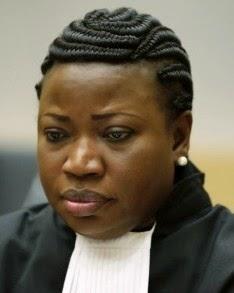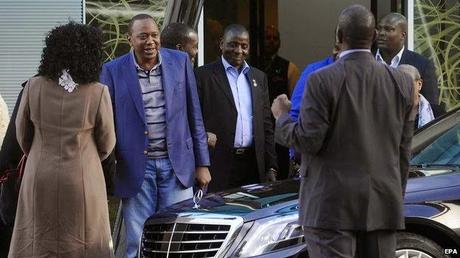 It is – ‘International
Criminal Court’ an intergovernmental
organization and international tribunal that sits in The Hague in the
Netherlands. The ICC has the jurisdiction to prosecute individuals for the
international crimes of genocide, crimes against humanity, and war crimes and
it may one day be able to exercise jurisdiction over the crime of aggression.
The Rome Statute is a multilateral treaty which serves as the ICC's
foundational and governing document. States which become party to the Rome
Statute, by ratifying it become member states of the ICC. Currently, there are
122 states which are party to the Rome Statute and therefore members of the
ICC. Fatou B. Bensouda, a Gambian lawyer, former government civil servant is
the chief prosecutor since June 2012.
The Kenyan president, Uhuru Kenyatta, has stepped down temporarily and is attending a hearing at the international
criminal court. Kenyatta faces charges of crimes against humanity at the ICC,
which is based at The Hague, Netherlands, over allegations that he helped
instigate violence that followed Kenya’s December 2007 presidential election,
when more than 1,000 people were killed. The court ordered him to attend a
status hearing on Wednesday, denying his request that he participate by video.
The hearing will be the first time a sitting president has attended an ICC
session, a milestone Kenyatta’s political supporters have urged him to avoid. Seeking
to bypass that notation in history, the president said on Monday that he would
invoke a hitherto unused article of the constitution that will see the deputy
president, William Ruto, temporarily become president. In his speech, Kenyatta
maintained his innocence, noted that the ICC prosecutor had been admonished by
the court for her faltering case and recalled that the African Union had passed
a resolution granting immunity from international tribunals for sitting
presidents. Kenyatta also claimed that Africa’s “century of exploitation and
domination” by the west was continuing. Critics of the ICC note that it has
only prosecuted Africans.
Mr Kenyatta was elected in
2013, despite facing charges. Analysts said he turned the prosecution to his
advantage, portraying it as foreign intervention in Kenya's domestic affairs. Mr
Kenyatta faces five charges relating to the ethnic massacres - the worst
violence in Kenya since independence in 1963. Tens of thousands of people were
displaced and Kenya's reputation for stability was tarnished. Mr Kenyatta was a
close ally of President Mwai Kibaki, who was declared the winner of the 2007
election. Mr Kibaki's rival, Raila Odinga, claimed the poll was marred by
fraud. The dispute took on an ethnic dimension, pitting members of the Kikuyu
ethnic group of Mr Kenyatta and Mr Kibaki against other communities. Mr
Kenyatta is accused of organising an ethnic Kikuyu gang, the Mungiki sect, to
attack rival groups. Vice-President Ruto also faces charges at The Hague, but
he was on Mr Odinga's side during the violence. He also denies the charges.
It is – ‘International
Criminal Court’ an intergovernmental
organization and international tribunal that sits in The Hague in the
Netherlands. The ICC has the jurisdiction to prosecute individuals for the
international crimes of genocide, crimes against humanity, and war crimes and
it may one day be able to exercise jurisdiction over the crime of aggression.
The Rome Statute is a multilateral treaty which serves as the ICC's
foundational and governing document. States which become party to the Rome
Statute, by ratifying it become member states of the ICC. Currently, there are
122 states which are party to the Rome Statute and therefore members of the
ICC. Fatou B. Bensouda, a Gambian lawyer, former government civil servant is
the chief prosecutor since June 2012.
The Kenyan president, Uhuru Kenyatta, has stepped down temporarily and is attending a hearing at the international
criminal court. Kenyatta faces charges of crimes against humanity at the ICC,
which is based at The Hague, Netherlands, over allegations that he helped
instigate violence that followed Kenya’s December 2007 presidential election,
when more than 1,000 people were killed. The court ordered him to attend a
status hearing on Wednesday, denying his request that he participate by video.
The hearing will be the first time a sitting president has attended an ICC
session, a milestone Kenyatta’s political supporters have urged him to avoid. Seeking
to bypass that notation in history, the president said on Monday that he would
invoke a hitherto unused article of the constitution that will see the deputy
president, William Ruto, temporarily become president. In his speech, Kenyatta
maintained his innocence, noted that the ICC prosecutor had been admonished by
the court for her faltering case and recalled that the African Union had passed
a resolution granting immunity from international tribunals for sitting
presidents. Kenyatta also claimed that Africa’s “century of exploitation and
domination” by the west was continuing. Critics of the ICC note that it has
only prosecuted Africans.
Mr Kenyatta was elected in
2013, despite facing charges. Analysts said he turned the prosecution to his
advantage, portraying it as foreign intervention in Kenya's domestic affairs. Mr
Kenyatta faces five charges relating to the ethnic massacres - the worst
violence in Kenya since independence in 1963. Tens of thousands of people were
displaced and Kenya's reputation for stability was tarnished. Mr Kenyatta was a
close ally of President Mwai Kibaki, who was declared the winner of the 2007
election. Mr Kibaki's rival, Raila Odinga, claimed the poll was marred by
fraud. The dispute took on an ethnic dimension, pitting members of the Kikuyu
ethnic group of Mr Kenyatta and Mr Kibaki against other communities. Mr
Kenyatta is accused of organising an ethnic Kikuyu gang, the Mungiki sect, to
attack rival groups. Vice-President Ruto also faces charges at The Hague, but
he was on Mr Odinga's side during the violence. He also denies the charges.
 The ICC is a court of last
resort, intervening only when national authorities cannot or will not
prosecute. It aims to give rulings on disputes between governments rather than
prosecuting individuals. The court has no retrospective jurisdiction - it can
deal only with crimes committed after 1 July 2002 when the 1998 Rome Statute
came into force. All of the cases currently open are in Africa - prompting some
African leaders to say it is biased. The court's first verdict, in March 2012,
was against Thomas Lubanga, the leader of a militia in Democratic Republic of
Congo. He was convicted of war crimes relating to the use of children in that
country's conflict and sentenced in July to 14 years.
Among those wanted by the
ICC are leaders of Uganda's rebel movement, the Lord's Resistance Army, which
is active in northern Uganda, north-eastern DR Congo and South Sudan. Its
leader, Joseph Kony, is charged with crimes against humanity and war crimes,
including abduction of thousands of children and forcing them to kill their own
parents. He remains at large and refuses to sign a peace deal until the ICC
arrest warrant is revoked.
The ICC has no police force of its own to track
down and arrest suspects. Instead it must rely on national police services to
make arrests and seek their transfer to The Hague. Interestingly, only y one
Arab state has ratified so far – Jordan and US has not. Bill Clinton did eventually sign the treaty
in one of his last acts as president but it was never ratified by Congress. The
US threatened to pull its troops out of the UN force in Bosnia unless they were
given immunity from prosecution by the ICC. In a much-criticised decision, the
UN Security Council voted in July 2002
on a compromise that gave US troops a 12-month exemption from prosecution -
renewed annually. The participant States fund this - Japan, Germany, France and Britain are among
the the largest contributors.
With regards – S.
Sampathkumar
8th Oct 2014.
The ICC is a court of last
resort, intervening only when national authorities cannot or will not
prosecute. It aims to give rulings on disputes between governments rather than
prosecuting individuals. The court has no retrospective jurisdiction - it can
deal only with crimes committed after 1 July 2002 when the 1998 Rome Statute
came into force. All of the cases currently open are in Africa - prompting some
African leaders to say it is biased. The court's first verdict, in March 2012,
was against Thomas Lubanga, the leader of a militia in Democratic Republic of
Congo. He was convicted of war crimes relating to the use of children in that
country's conflict and sentenced in July to 14 years.
Among those wanted by the
ICC are leaders of Uganda's rebel movement, the Lord's Resistance Army, which
is active in northern Uganda, north-eastern DR Congo and South Sudan. Its
leader, Joseph Kony, is charged with crimes against humanity and war crimes,
including abduction of thousands of children and forcing them to kill their own
parents. He remains at large and refuses to sign a peace deal until the ICC
arrest warrant is revoked.
The ICC has no police force of its own to track
down and arrest suspects. Instead it must rely on national police services to
make arrests and seek their transfer to The Hague. Interestingly, only y one
Arab state has ratified so far – Jordan and US has not. Bill Clinton did eventually sign the treaty
in one of his last acts as president but it was never ratified by Congress. The
US threatened to pull its troops out of the UN force in Bosnia unless they were
given immunity from prosecution by the ICC. In a much-criticised decision, the
UN Security Council voted in July 2002
on a compromise that gave US troops a 12-month exemption from prosecution -
renewed annually. The participant States fund this - Japan, Germany, France and Britain are among
the the largest contributors.
With regards – S.
Sampathkumar
8th Oct 2014.
Photo and news credit : BBC from various articles.

